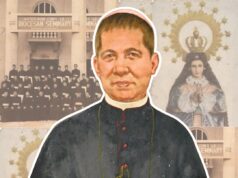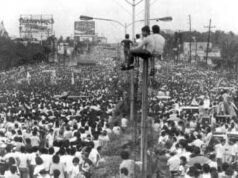Robert (not his real name), 15, literally died in the hands of another child. There was nothing particularly unusual to that Sunday morning the incident happened, except, of course to the fact that unlike the other young inmates inside this DSWD-run rehabilitation center, Robert and Michael (not his real name), 16, had no visitors.
Nobody cares. Ultimately, nobody loves them. These are the painful poster-like messages plastered everywhere. These are the Damocles’ swords that these young minds endured, almost every Sunday and on weekends of their lives while serving their time in rehabilitation. Some of the children are visited by family and kins, one way or the other. A handful, where Robert and Michael belong, shares a different experience. Their family members, as often is the case, could not afford the fare to the rehabilitation.
The feeling of not being loved, abandoned and left alone is universal. The feeling is not unique, or even true only to Robert and Michael. We all know this feeling. The feeling annihilates all reason for existence. The feeling is like losing the very ground upon which you stand. The feeling is a dagger-like pain pierced into your heart, leaving you in grimace, while slowly snapping the oxygen off you.
This is what Robert and Michael experienced one Sunday morning. The children in the rehabilitation center have a term to capture the experience: “buryong”. And like most children exposed to brutality, they have no recourse but to handle the feeling by brutal means. Left alone in their rooms while other children attend to their family visitors, Robert and Michael agreed on a “game” of fist fight. To avoid the ire and further punishment of tending adults in the rehabilitation center, Robert and Michel decided to wrap their arms with their white t-shirts, in a sort of Manny- Pacquiao-like gloves.
At the end of the fight, Michael suffered two black eyes and a swollen right eardrum. Robert, on the other hand, was hit on his mid-section of his chest. From Michael’s account, Robert was grasping for breathe when a blow hit him. Robert fell to the pavement. In seconds, Robert lost consciousness. Robert was rushed lifeless to a nearby hospital. He was revived to life by attending doctors. After a while, Robert was on a comatose.
Last I heard, Robert’s family negotiated to bring Robert’s comatosed body to their province. After two weeks, Robert died. When I asked Michael what and how he felt about the incident, he gave me a nonchalant, almost bereft of any remorse whatsoever, answer: “Kuya, kung ako ‘yung tinamaan, ako ‘yung plakda”.
After trying to find ways to make sense of the death of Robert, or Michael’s stern attitude towards killing Robert, I was reduced to simply understand the context of Robert’s and Michael’s life. Robert wanted to work in a nearby market before he was arrested for theft. The rice store where he wanted to work demanded a picture for his one-page resume. Robert knew his parents would not be able to provide him with the necessary money for his photo. His friends are equally money-strapped. He tried asking help from relatives, but to no avail. In desperation, he stole the electric fan of his neighbor. This is not the first time Robert was ever caught as he had done a couple of stealing for the thrill, as Robert himself would attest, and yes for survival, as there was no option left for him. Though the stealing was not the first time, it was, according to Robert’s young mind the first time he wanted a change for his life. He wanted to earn his keep.
Michael’s story is no better. Michael came from an equally dysfunctional family. His father abandoned them. Michael’s mother had several relationships before she succumbed to tuberculosis and died. Michael was left to tend for himself while his four siblings were given to other relatives and friends. Michael swore that his youngest sister is being molested by his third stepfather. Michael promised that he would get all his siblings in one roof, someday.
Honey Carandang, in her book Filipino Children Under Stress, says that to fully understand an individual, for that matter a child, one has to look at the child’s family. However, Carandang also points that in order to understand the dynamics within the family, we all have took at the societal context upon which these families operate.
If we look at the lives of our children, for that matter Robert’s and Michael’s, what do they tell us of our families? Nay, what do they tell us of our society? Robert’s and Michaels lives, and the many like them, are the very reasons why we insist on the “daang matuwid.” The more and more of our children not given the chance of school, the more we will have Robert and Michael. The more and more we stop being vigilant in allowing children to work for their upkeep, we will not have an end to Robert’s and Michael’s story. The more and more corruption we tolerate, Robert’s death and Michael’s dreams will remain mists without reason.
The more Roberts and Michaels we have in our midst, the more and more reason we have to stop calling ourselves the only Christian country in Asia.
tobe_wtdpoor@yahoo.com
Nobody cares. Ultimately, nobody loves them. These are the painful poster-like messages plastered everywhere. These are the Damocles’ swords that these young minds endured, almost every Sunday and on weekends of their lives while serving their time in rehabilitation. Some of the children are visited by family and kins, one way or the other. A handful, where Robert and Michael belong, shares a different experience. Their family members, as often is the case, could not afford the fare to the rehabilitation.
The feeling of not being loved, abandoned and left alone is universal. The feeling is not unique, or even true only to Robert and Michael. We all know this feeling. The feeling annihilates all reason for existence. The feeling is like losing the very ground upon which you stand. The feeling is a dagger-like pain pierced into your heart, leaving you in grimace, while slowly snapping the oxygen off you.
This is what Robert and Michael experienced one Sunday morning. The children in the rehabilitation center have a term to capture the experience: “buryong”. And like most children exposed to brutality, they have no recourse but to handle the feeling by brutal means. Left alone in their rooms while other children attend to their family visitors, Robert and Michael agreed on a “game” of fist fight. To avoid the ire and further punishment of tending adults in the rehabilitation center, Robert and Michel decided to wrap their arms with their white t-shirts, in a sort of Manny- Pacquiao-like gloves.
At the end of the fight, Michael suffered two black eyes and a swollen right eardrum. Robert, on the other hand, was hit on his mid-section of his chest. From Michael’s account, Robert was grasping for breathe when a blow hit him. Robert fell to the pavement. In seconds, Robert lost consciousness. Robert was rushed lifeless to a nearby hospital. He was revived to life by attending doctors. After a while, Robert was on a comatose.
Last I heard, Robert’s family negotiated to bring Robert’s comatosed body to their province. After two weeks, Robert died. When I asked Michael what and how he felt about the incident, he gave me a nonchalant, almost bereft of any remorse whatsoever, answer: “Kuya, kung ako ‘yung tinamaan, ako ‘yung plakda”.
After trying to find ways to make sense of the death of Robert, or Michael’s stern attitude towards killing Robert, I was reduced to simply understand the context of Robert’s and Michael’s life. Robert wanted to work in a nearby market before he was arrested for theft. The rice store where he wanted to work demanded a picture for his one-page resume. Robert knew his parents would not be able to provide him with the necessary money for his photo. His friends are equally money-strapped. He tried asking help from relatives, but to no avail. In desperation, he stole the electric fan of his neighbor. This is not the first time Robert was ever caught as he had done a couple of stealing for the thrill, as Robert himself would attest, and yes for survival, as there was no option left for him. Though the stealing was not the first time, it was, according to Robert’s young mind the first time he wanted a change for his life. He wanted to earn his keep.
Michael’s story is no better. Michael came from an equally dysfunctional family. His father abandoned them. Michael’s mother had several relationships before she succumbed to tuberculosis and died. Michael was left to tend for himself while his four siblings were given to other relatives and friends. Michael swore that his youngest sister is being molested by his third stepfather. Michael promised that he would get all his siblings in one roof, someday.
Honey Carandang, in her book Filipino Children Under Stress, says that to fully understand an individual, for that matter a child, one has to look at the child’s family. However, Carandang also points that in order to understand the dynamics within the family, we all have took at the societal context upon which these families operate.
If we look at the lives of our children, for that matter Robert’s and Michael’s, what do they tell us of our families? Nay, what do they tell us of our society? Robert’s and Michaels lives, and the many like them, are the very reasons why we insist on the “daang matuwid.” The more and more of our children not given the chance of school, the more we will have Robert and Michael. The more and more we stop being vigilant in allowing children to work for their upkeep, we will not have an end to Robert’s and Michael’s story. The more and more corruption we tolerate, Robert’s death and Michael’s dreams will remain mists without reason.
The more Roberts and Michaels we have in our midst, the more and more reason we have to stop calling ourselves the only Christian country in Asia.
tobe_wtdpoor@yahoo.com




